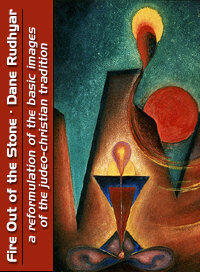 |
| Home | Bio | Art | Music | Literature | Civilization & Culture | Philosophy of Wholeness | Theosophy & Spirituality | Astrology |

FIRE OUT OF THE STONE A Reformulation of the Basic Images of the Judeo-Christian Tradition by Dane Rudhyar, 1962 1. Not to Repeat, But to Renew 2. The Essence and the Substance 3. To Become "More-Than-Man" 4. The Fatherhood of God • Page 1 • Page 2 • Page 3 5. At the Center is Soul 6. Creation and Evolution 7. Crisis and Sin 8. The Coming-Together of God and Man 9. Christ-Love: The Covenant with Individual 10. The Life of Mediation and its Paradox
: : :
This title was first published by Sevire, 1963. Cover for the online edition copyright © 2008 by Michael R. Meyer. : : : : : :
"Thy God is a cosumming fire." Duet. 4:25 "He shall baptize you with the Holy Spirit and with fire." Matthew 3:11 "I am come to send fire on the earth." Luke 12:49
: : :
|

4. THE FATHERHOOD OF GOD - page 2"And call no man your father upon the earth; for one is your Father which is in heaven"
Matthew 23 : 9 Christian doctrines speak constantly of the Fatherhood of God and the brotherhood of man; but it does not seem clear to those who make such utterances that fatherhood is always an activity, a power; and that no son can be a true son unless this power is also active within him. The power is always in every man, latent though it be. All that we can really "know" of our divine Father is His power — until we "come of age" and use this power consciously for the one purpose of divine love. Then we are the Father. "I and my Father are one". Not one in essence, perhaps, in most cases; but one in activity. The keynote of the whole message of Jesus is activity — oneness with the Father by acting out individually the power of Fatherhood. Act as God and God will be you; because God is activity, yet activity of a unique kind — activity that is utterly motivated and controlled by divine Love. This divine love is essentially a will to harmony, a harmony which leaves out nothing and no one. By the activity of that love all discords are fused into an all-inclusive harmony. This love is divine healing; it is that which makes whole all that lives, suffers, thinks and aspires. Love is the motive of all divine creation; creativity (Fatherhood) is the power. Man's task is so to develop the intensity of the motive of love that the power of creativity, the Holy Spirit, spontaneously flows outward from the center of his being toward all discords and all sickness. The spirit is "holy" because it is the power that re-establishes — or seeks to re-establish — harmony everywhere, because it makes everything that had become separate and beset by conflicts, whole. The entire process of Creation is a divine activity aiming at reestablishing universal harmony — the harmony between unity and multiplicity, between the one Center and the many centers, indeed between God and individual souls. This harmony is forever broken, forever re-established, because God is Motion. God is; souls are. But they are in Him and out of Him; and He is in them, as the seed is in the plant issuing from it. There are souls because God's essential attribute is creativity. He is always and forever Fatherhood at work, a perpetual outpouring of creative energy. This is how Jesus must have "known" Him; this is why he could only speak of Him as "Father". One can hardly give a defining name to an immense flow of power within which one is immersed. Fatherhood is a power, as light is power. The visionary young Pharaoh, Akhnaton, hymned the Sun-disc, Aton, as the divine Source of Light and Life. The Gnostic followers of Jesus also composed hymns to the Fatherhood of the One Father. But Jesus very simply states the fact that he and the Father are one. "I am He". He who is utterly a giver of light need not sing paeans to the light. He is light. He "knows" light simply by being light, by acting out the power that gives illumination. This is the central truth of dynamic Christianity, a Christianity which still could transfigure the world, if it had first experienced the Transfiguration in the persons of its leaders and of at least some of its members. But such an experience means that all the progressive steps that lead to it have been taken. And no one reaches the goal who has not had the faith and the courage to accept the responsibility of acting out the power of the Fatherhood — the power of the creativity in love. Such a courage and faith are not easily summoned by men at our present stage of human evolution. As long as men are still dominated by the compulsive blindness of instincts and emotional desires, it is difficult for them to imagine themselves as agents of God, entrusted with creative power; or, if they have sufficient imagination, they very often lack the motive-power of divine love and compassion for all. Nevertheless, Jesus believed that men could have the faith, the courage and the imagination. He sought to remove from men's souls and minds the dogmatic obstacles, the fears, the timidity that stand in the way of the realization of divine Sonship. He proclaimed the ascendancy of conscious and divine love over unconscious life-impulses. He gave his disciples his promise that they could act as he acted and perform still "greater things" if only they acted "in the name of Christ" and with the power of the Holy Spirit — the power of the Fatherhood adjusted to the new conditions of man's existence. This promise was not exclusively directed to the twelve Apostles. We can consider these twelve as prototypes (i.e. first typical manifestations) of men seeking to become "disciples of Christ"; just as Jesus was the prototype of the new man, the Christ-man, the man in whom divine Sonship had become completely focused, individualized, incorporated and efficacious on earth. But there have been thousands and there will be millions of disciples of Christ, each more or less unfolding his growth in spirit along one of the twelve basic approaches from man to God represented by the twelve original disciples. And there have been men since Jesus who have become one with Christ in their transfiguration. Jesus was the "First Born", but not the one and only "Son". Divine Sonship is "one", but of sons there must be many. The Mastery is one, but there are many "Masters". When the Church stresses the idea that Jesus Christ is the "only begotten", it chooses to interpret the Greek term monogenes in a narrow way. This term means rather "singly begotten" or better still, "created in a single act of creation". Christ, the Son, is a direct, immediate creation of the Father in spirit, while men are indirect and gradual creations produced in the dark matrix of life on earth, and requiring a "divine intervention" — the manifestation of the Christ, as an Exemplar and Guide — to be able to reach the stage of divine Sonship. Christ shows the Way; men must follow Him. Christ is the Way; men must "live in" Christ, must "put on Christ" as St. Paul said. Nevertheless they, and only they, can do the walking and the living. The goal is the same, as the source of divine Fatherhood is one source, and all powers are one Power. Spirit is always, at any time and under any one of its multitudinous aspects, this one Power of the Fatherhood of God. Men who have become individuals, emerged from the binding norm of earth-bound mankind, can only live truly spiritual lives as they become positively oriented toward the spirit. Through this positiveness of approach they make it possible for the spirit likewise to act positively toward them. They thus become "inspirited"; they receive the Holy Spirit that Christ promised to those who would become in truth and reality His disciples. But Jesus also said: "Ask and it shall be given you". The great principle of the spiritual life is that it is man's asking which conditions God's giving. It is the way an individual asks, the quality of the asking and the formulation given to the request which establish the conditions under which the Holy Spirit can descend into the man. Spirit answers the need; but it is the characteristics of the need and the conscious recognition by the individual person of his own need which shape the form of Spirit's answer. This explains the value and importance of prayer, of one type or another. To pray is to formulate one's individual need. There must be a formulation if there is to be an answer — at least insofar as values relative to growth in spirit are concerned — for these values must be consciously apprehended by the individual person; only in the sphere of life and mere life-preservation can there be automatic answers to man's needs. The would-be disciple of Christ must pray. He must thus positively orient himself to Spirit and to the Father. He must acknowledge the Father so that the Father may acknowledge him — and eventually entrust him with the power of the Fatherhood. For this reason Jesus gave a Prayer to his disciples. It is the prototype of all similar prayers in which man, on his way to the transfiguration, acknowledges God as his Father, asks for what he needs on his path to discipleship, and ultimately anticipates the final experience of the Fatherhood, the "vision of God". To call this Prayer the "Lord's Prayer" is however the result of a profound misunderstanding of what is meant by the "Lord" in the Old Testament, as we shall presently see. It is Jesus' Prayer, a prayer for disciples on the way to the Christ-man state, offered to them as guidance and as a focal point for daily meditation by the first among men to attain, as man, perfect union with Christ.  Home | About | Calendar | Ephemeris Charts | Art Gallery | Library | Resources Shop | Rudhyar Archival Project | Help Web design and all data, text and graphics appearing on this site are protected by US and International Copyright and are not to be reproduced, distributed, circulated, offered for sale, or given away, in any form, by any means, electronic or conventional. See Notices for full copyright statement and conditions of use. Web design copyright © 2000-2004 by Michael R. Meyer. All Rights Reserved. |